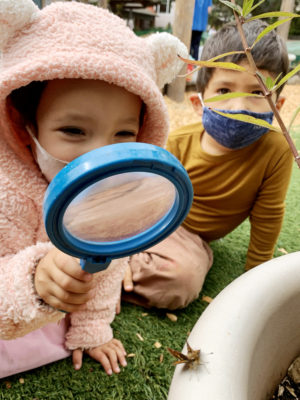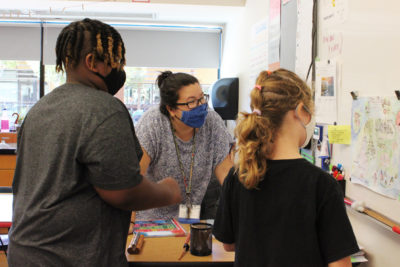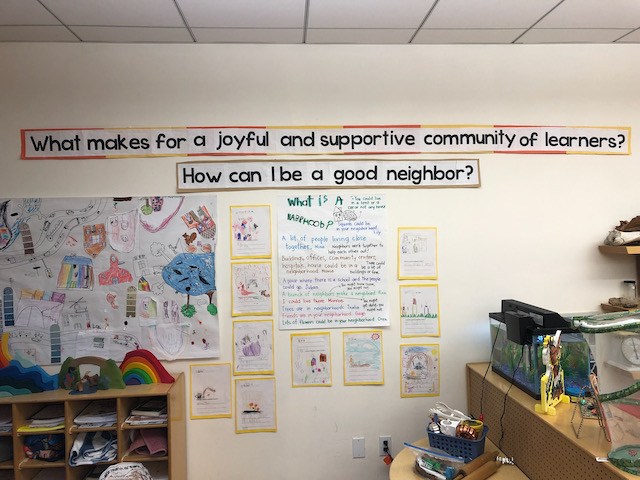by Mitch Bostian
At The Berkeley School, our mission – ignite curious minds, awaken generous hearts, engage a changing world – guides and connects everything from the everyday interactions among students, teachers and learning environments to our academic program design and our long-term strategic planning initiatives. These ten words direct us, inspire us, and provide us with the sense of shared purpose that allows us to take on the dynamic and challenging work of teaching and learning with perseverance, resilience, and joy.
How can ten words be this powerful? For us, the answer lies in two values – agency and interdependence – that are foundational to the way we approach education at TBS. Each of those ten words has agency – what they mean matters – and none of them is as meaningful as all of them, taken together. Their straightforward simplicity belies a complex relationship, and complexity always deserves a closer look.
Our mission begins with ignite curious minds. In schools, teaching and learning activities often focusing on developing minds, and minds develop as the result of interactions among neurological structures and processes that are influenced by the physical, intellectual, social, and emotional stimuli resulting from our experiences of the world around us. We believe that all minds are innately curious about that world – that all minds have the capacity and motivation to notice, to investigate, and to learn. Our purpose, and joy, as educators is to design curricula, environments, and experiences that ignite that innate curiosity – from preschool through middle school. Some moments of ignition are immediate and obvious, as when early childhood students move through the classroom to label items as “living” or “nonliving” and begin to think more deeply about what it means for something to be alive. Some are elongated and more subtle, as when an eighth grader studies the case of Korematsu vs. United States, and develops an interest in civics, law, and activism that unfolds through high school, college, and beyond.

Curiosity ignited!
While much of our work centers around igniting minds, we believe that such work can’t be done in isolation. Physical, social, and emotional elements are critical ingredients in the holistic teaching and learning that leads to deep understanding, and that all children deserve. Our mission’s next three words, “awaken generous hearts,” speak to this belief, and to the relationship between minds and hearts.
We see that when children’s curious minds are ignited, they come into the present moment of their learning: they are fully aware, attentive, and alive to the sensorial input (and associated reflections) that flow from their curiosity-driven experiences. As educators, we know that if we provide space, time, and language for students to attend to that sensorial input, their hearts will awaken: curiosity will lead them to experience feelings, and those feelings are the language of their awakened hearts. We believe that each of those hearts is generous, because children want to see others experiencing the same kind of safety, happiness, and respect that they themselves want to feel. Consequently, when students whose ignited, curious minds identify problems or challenges that awaken their generous hearts, the solutions they propose will reflect an empathic desire for “fairness of experience” and use impact on others as a core criteria for evaluating success. We believe that these students will grow up to focus on more than simply making change – they will think critically, and compassionately, about the changes they and others want to make.
So while we ignite curious minds and awaken generous hearts to build academic and social-emotional skills, we believe our work has a greater purpose: to prepare our students to engage a changing world. We end with the world because we believe that all education should be done with the world, and the future, in mind. We add the word “changing” because we believe that education for the world of today is never enough. Children change from moment to moment, as does the world, and an education that incorporates both truths of our time and visions for a better future ensures that the skills and values children develop will lead to the adult agency that allows them to engage change. When, in the context of Dia de los Muertos, our K-8 Spanish students learn about the conditions and practices that have led to the deaths of young immigrant children in detention camps in the region bordering Mexico, they develop their understanding of a complex problem while deepening their empathy and compassion for others. In the process, they see their potential as changemakers, and strengthen their belief that what they do, now and the future, will matter.

White cempazuchitl (marigold) made by TBS students, to be woven into the fence of the UAC campus in memory of the young immigrant children who have passed away at the detention camps in the border region.
Engage describes the way we hope our graduates will connect to the world and build a relationship that is not transactional but deepens over time – one characterized by curiosity, mutual respect, and a desire to understand, learn, and grow. Such a relationship will continue to ignite minds and awaken hearts for decades to come.

What happens when children whose curious minds are ignited and whose generous hearts are awakened encounter the world around them? What happens when your child greets you after a full day spent with friends and teachers, working, learning, and having fun? On those days, you can feel your child’s satisfaction, contentment, and openness right away. The conversations on the way home these days surprise you – you hear your child ask a question or make an observation about the world that reminds you how quickly they are learning and growing, and how their lived experience is both similar to, and different from yours. In these moments, you’re witnessing the way that igniting curious minds and awakening generous hearts equips children to engage their changing world. We are grateful for the children reminding us of the school’s mission to connect us as a school community, learning, and living, together.

